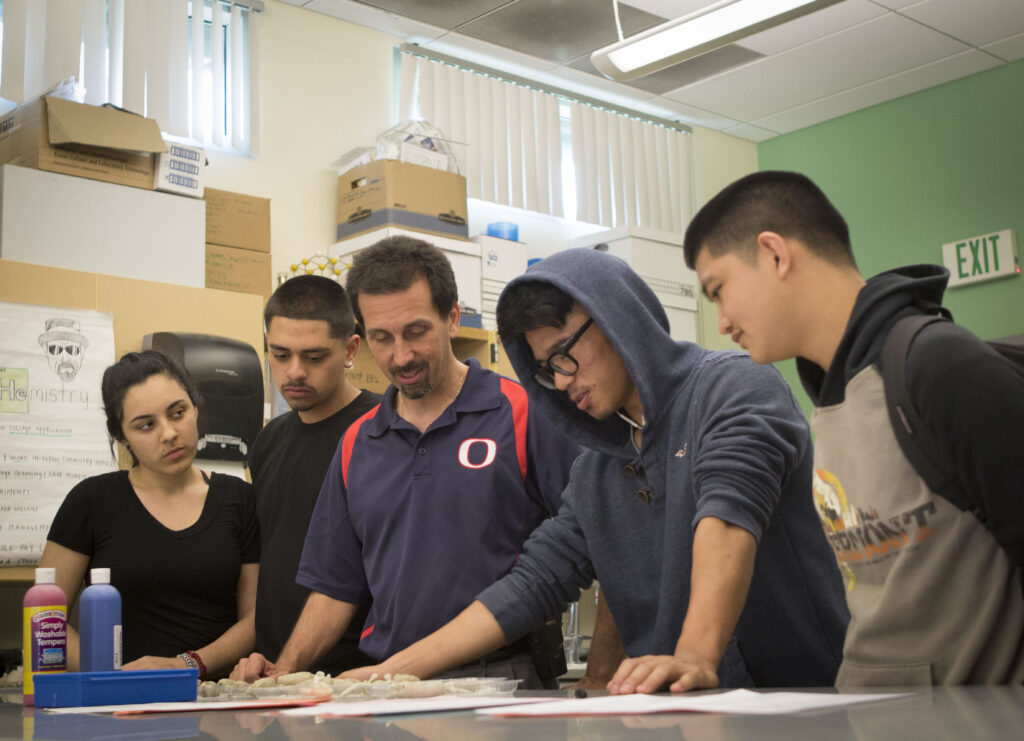EdSource is conducting a series of interviews featuring educators’ experiences with the Common Core State Standards. For more information about the Common Core, check out our guide.
Vito Chiala has been the principal of Overfelt High School in San Jose for eight years. Prior to that he was assistant principal of the school for three years, and before that he taught there for three years.
Chiala’s first teaching assignment was at Foothill High School in San Jose. Chiala, however, said he had not intended to be an educator. After obtaining a bachelor’s degree in English at San Francisco State University, he managed restaurants at San Francisco’s Westin St. Francis Hotel. But Chiala felt something was missing. “I didn’t feel like I was making an impact on society,” he said. A friend told him about an opening at Foothill High School in East San Jose, a continuation school, where he would work with students who had been failing academically. His job was to help prepare them for taking the high school equivalency, or GED, test.
“From the first day in the classroom, I knew it was what I wanted to do,” Chiala said. He later went back to school and earned a master’s degree in education from San Jose State University. The students at Foothill, he said, came from rough backgrounds.
“They were students who had bounced around from school to school,” he said. “They had discipline issues, gang associations, drug issues, mental health and health issues.” But Chiala said that he saw from the beginning that these students were engaged. “I think really what it was is they could see I was willing to listen to what they had to say, and I was able to convey a general interest in getting them to develop.”
Perhaps the most profound experience in his years of teaching at Foothill was coaching the robotics team. The team competed against schools with students from affluent backgrounds that had support from the Massachusetts Institute of Technology. His team, however, won the U.S. FIRST national championship in 2000.
In his years at Overfelt, the school has changed from being a school where kids could go to college, “but it definitely wasn’t the culture.” Now, he says, with the shared vision of the staff that works there, the kids who attend Overfelt are expected to go to college.
What has been the greatest challenge for you in shifting your school to the Common Core?
We were all anticipating the challenges that come with any significant transition. From my perspective, the biggest challenges have come in finding ways to support dedicated teachers in making the instructional shifts required to successfully implement the Common Core. This demands high quality professional development that prepares teachers to shift instruction in ways that are more student centered, that develop college readiness skills like creative thinking, critical thinking, and collaboration, and that continues to focus on rigorous course content. To support the implementation of these instructional shifts we have to create opportunities for frequent teacher collaboration facilitated by less traditional leadership structures. Teachers have to receive regular constructive feedback and ongoing coaching. There does not seem to be a real clear blueprint to follow to make all of this happen. In many cases we are all learning as we go.
What do principals need to do differently for their schools to successfully implement the new Common Core standards?
Like teachers, I believe school leaders also need to adapt their practices to support the implementation of the Common Core. For example, if we are asking teachers to be more student centered, we have to structure our professional development to be more teacher centered, allowing teachers to own their professional growth in the same ways that the Common Core demands that students own their learning. This requires a shift from the more traditional, hierarchical leadership styles to a more open style with flatter structures. I think educational leaders also have to model “risk taking” and promote experimentation with students and staff. We have to get into classrooms frequently to monitor progress and identify strengths and gaps. Finally, I find that we have to be educational leaders as learners and not experts. We are all adapting to the Common Core together: students, staff, and school leaders.
What do you like about the Common Core?
I really like that the Common Core provides a shared definition for college and career ready. The standards maintain the required rigor but also demand the student-centered instructional shifts that develop 21st century skills. I believe the focus on college readiness skills and the shift to student-centered instruction will benefit all students but particularly students who have not traditionally found success in our educational system. The Common Core standards provide a focus to truly prepare all of our students for college and careers.
Are there things you dislike about the Common Core?
Most of my concerns with the Common Core tend to be with the implementations. With any new initiative, we would expect challenges. I do think the roll out could have been smoother and better supported with a clearer blueprint. I also realize that many of the resources to support the implementation have gone into the technology and infrastructure required to implement the assessments. It would have been nice to have more resources dedicated to professional development. All in all, these are all challenges that were expected and will be overcome.
To get more reports like this one, click here to sign up for EdSource’s no-cost daily email on latest developments in education.
